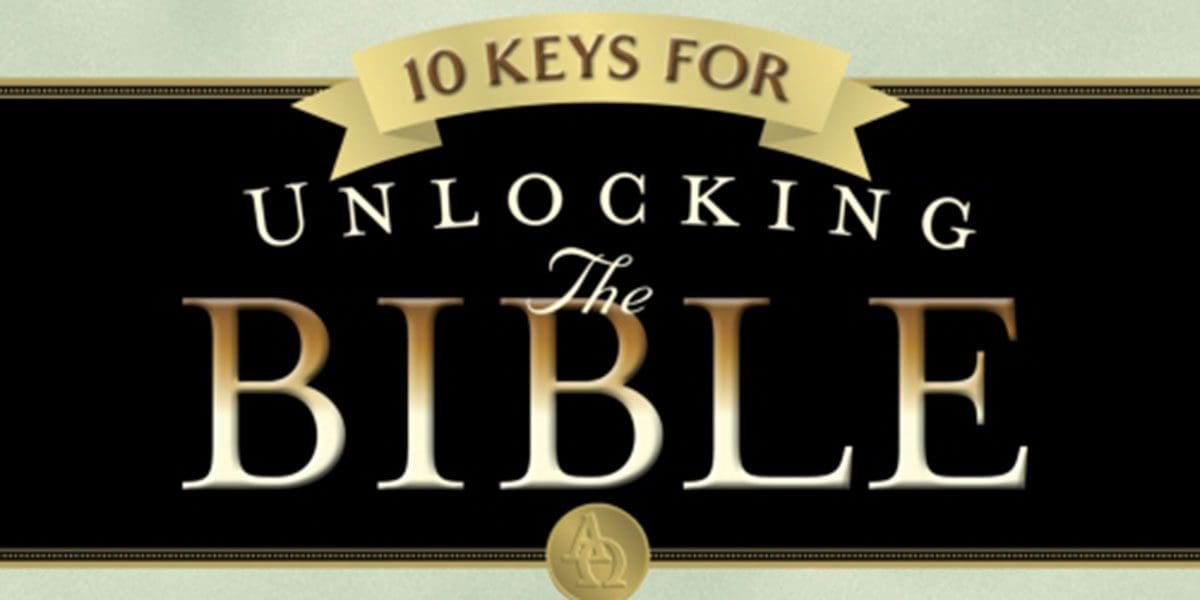When Hushai came to Absalom, Absalom said to him, “Thus has Ahithophel spoken; shall we do as he says? If not, you speak.” (2 Samuel 17:6)
Please open your Bible at 2 Samuel 17. We are following the story of Absalom’s rebellion against his father David. David was God’s anointed king. So when Absalom rebelled against David, he was rebelling against God. This is the story of a great rebellion against God — how it grows and where it ends.
It’s a snapshot of this world in which we live, and we are seeing that it speaks powerfully to the moment in time in which we find ourselves today.
Absalom charmed the people. They were swept up in a massive delusion and they lost faith in God’s anointed king: “The hearts of the men of Israel have gone after Absalom” (2 Samuel 15:13).
David, therefore, had to flee from Jerusalem. He left the throne, and he left the palace. He walked across the Kidron Valley with only a small band of loyal followers and made his way up the Mount of Olives, barefoot and weeping as he went.
As we take up the story today, we are going to see what happened in Jerusalem on that same day when David left the city. David and his small band of loyal supporters left Jerusalem heading east over the Kidron, and up the Mount of Olives. A few hours later Absalom arrived, coming from Hebron in the south.
It’s clear from the story that David got out of Jerusalem just in time. “Then David said to all his servants who were with him at Jerusalem, ‘Arise, and let us flee, or else there will be no escape for us from Absalom. Go quickly, lest he overtake us quickly and bring down ruin on us and strike the city with the edge of the sword’” (2 Samuel 15:14).
David had a small band of followers, but it is clear that Absalom had amassed a large force: “Now Absalom and all the people, the men of Israel, came to Jerusalem…” (2 Samuel 16:15). At this point in the story, we are going to turn the camera back to Jerusalem to see what happened after David left the city.
The Story of Two Counselors
Now Absalom and all the people, the men of Israel, came to Jerusalem, and Ahithophel with him. And when Hushai the Archite, David’s friend, came to Absalom, Hushai said to Absalom, “Long live the king! Long live the king!” (2 Samuel 16:15-16)
We are introduced here to two counselors who become central to the story — Ahithophel and Hushai. So this is a story about two counselors, and here’s what you need to know about these two men.
1. Ahithophel
Now in those days the counsel that Ahithophel gave was as if one consulted the word of God; so was all the counsel of Ahithophel esteemed, both by David and by Absalom. (2 Samuel 16:23)
Ahithophel was a fountain of wisdom. Ahithophel had been David’s counselor (2 Samuel 15:12), his strategic advisor. He shaped policy for the administration. But he had abandoned the palace and the king he once served and returned to his hometown of Giloh (2 Samuel 15:12).
Ahithophel was the grandfather of Bathsheba, and it may very well be that part of the price David paid for his sin with Bathsheba was that he lost the confidence and the support of his most trusted adviser.
What we know is that, at a later point, this man who was a fount of wisdom, joined up with Absalom and leant his support to the great rebellion. Here was a man who has been given extraordinary gifts. He was a brilliant strategist. At one time in his life, these gifts were deployed in the service of the king. But this gifted man gets swept up in the great deception, and he offers his gifts in the service of Absalom, and the great rebellion.
This raises the question: In what cause are your gifts and talents being deployed?
When Ahithophel went over to join Absalom, he did not cease to be a wise counselor. This was what worried David, If Absalom has Ahithophel advising him, he will know exactly what to do! That is why, when David was told that Ahithophel was “among the conspirators with Absalom,” David prayed, “O LORD, please turn the counsel of Ahithophel into foolishness” (2 Samuel 15:31). Today we are going to see that God answered this prayer quite remarkably, and he did it through a man named Hushai.
2. Hushai
So Hushai, David’s friend, came into the city, just as Absalom was entering Jerusalem. (2 Samuel 15:37)
When David came to the place of worship at the top of the Mount of Olives, this man Hushai came to meet him. Hushai was David’s loyal friend.
“While David was coming to the summit, where God was worshiped, behold, Hushai the Archite came to meet him with his coat torn and dirt on his head” (2 Samuel 15:32). The torn coat and the dirt in his hair were signs of mourning.
Hushai is loyal to David, and is ready give up everything and follow him into exile. But David has a better plan: “If you return to the city and say to Absalom, ‘I will be your servant, O king; as I have been your father’s servant in time past, so now I will be your servant,’ then you will defeat for me the counsel of Ahithophel” (2 Samuel 15:34).
The king says, “Hushai, the best thing you can do for me right now is not leave your home and your job and follow me into exile. Hushai, I want you to go back into the darkest place, the palace — into the heart of the rebellion — and serve me there.” That was a tough calling.
Hushai becomes a double agent! “You go back there, Hushai, and you will be my eyes and ears.” So here we have the story of two counselors. One of them is a fount of wisdom; the other is a spy!
Picture the scene in Jerusalem. Absalom and his new administration have moved into the palace. The self-appointed king calls in Ahithophel. “You are the fount of wisdom, so give me your counsel. This is the beginning of a new administration. Tell me what I should do.”
Ahithophel proposes a plan of immediate action. Ahithophel said to Absalom, “Let me choose twelve thousand men, and I will arise and pursue David tonight” (2 Samuel 17:1).
The reasons for an immediate pursuit of David were obvious: “I will come upon him while he is weary…” (2 Samuel 17:2). Let’s go after him when he is tired from his journey (cf., 2 Samuel 16:14). More than that, Ahithophel says, “I will come upon him while he is… discouraged… (2 Samuel 17:2). He hasn’t established a base yet. He is vulnerable. I will “throw him into a panic” (2 Samuel 17:2), and all the people who are with him will flee (2 Samuel 17:2).
Ahithophel’s plan was for immediate action with one focused objective: The elimination of David, God’s anointed king. “I will strike down only the king, and I will bring all the people back to you as a bride comes home to her husband” (2 Samuel 17:2-3).
Ahithophel’s plan was for what we would call — in military terms — an immediate surgical strike. We don’t want this to descend into a long civil war. We don’t want it to spiral out of control. The best plan is to eliminate David immediately.
There is absolutely no question that from Absalom’s point of view this was the very best advice he could get. That is why verse 14 refers to “the good counsel of Ahithophel.” It was good, not in the sense that it was honorable, because this was a wicked plan. What Ahithophel proposed was taking the life of God’s anointed king. That was the one thing that David refused to do to Saul.
Taking the life of David would have been the ultimate act of defiance against God. So the counsel of Ahithophel was ‘good’ in the sense that if Absalom’s rebellion was going to succeed, this was the way to do it.
It is extraordinary how the themes of the Old Testament recur in the New. We see this in the Last Supper: “And when they had sung a hymn, they went out to the Mount of Olives. Then Jesus said to them, ‘You will all fall away because of me this night. For it is written, I will strike the shepherd, and the sheep of the flock will be scattered’” (Matthew 26:30-31, emphasis added).
That is exactly what Ahithophel proposed to Absalom: Strike the shepherd, and if you take David out, the little band of his loyal followers will be scattered. And that is exactly what happened to Jesus. Caiaphas acted as the advisor to the Jews and he said to them that it would be expedient that one man should die for the nation (John 18:14).
Clearly there was general agreement around this plan for immediate and focused action. “And the advice seemed right in the eyes of Absalom and all the elders of Israel” (2 Samuel 17:4). You would think that since the advice seemed right to Absalom and the elders who had gathered round him, he would say to Ahithophel “Do it!”
But what happens next is the turning point of the story. “Then Absalom said, ‘Call Hushai the Archite also, and let us hear what he has to say’” (2 Samuel 17:5). So Ahithophel, the wise counselor is dismissed, “Thank you very much. We’ve heard your plan.” And Hushai is called in. Absalom has no idea that he is seeking counsel from spy!
Now when Hushai came in, Absalom might have said, as he said to Ahithophel, “Give me your counsel…” (2 Samuel 16:20). But he didn’t do that. When Hushai came to Absalom, Absalom said to him, “Thus has Ahithophel spoken; shall we do as he says? If not, you speak” (2 Samuel 17:6). So Absalom lays out the plan and asks for a second opinion. This gives Hushai the opportunity to pick all kinds of holes in Ahithophel’s plan.
Thank God for that; but there is a principle here that I don’t want us to miss. When you receive wise counsel and fail to act on it, you put yourself in a dangerous position. By questioning good counsel, Absalom opened himself up to bad counsel. And what we are going to get from Hushai is an example of bad counsel.
Two Distinguishing Marks of Bad Counsel
1. Bad counsel plays on unfounded fear
Hushai pokes holes in Ahithophel’s plan by inciting all kinds of fears that had no foundation in reality.
A. “What if you can’t beat him?”
“You know that your father and his men are mighty men, and that they are enraged, like a bear robbed of her cubs in the field.” (2 Samuel 17:8)
In other words, Ahithophel says, “Go after David when he is weary and discouraged,” but I don’t think you will find David weary and discouraged. I think you will find him like a bear robbed of her cubs. And Absalom, I think in your heart you know this. The truth was — David was weary and at his lowest point. What Hushai was doing was stirring up fears that were completely unfounded.
B. “What if you can’t find him?”
“Your father is an expert in war; he will not spend the night with the people. Behold, even now he has hidden himself in one of the pits…” (2 Samuel 17:8-9)
Absalom, you know what he is like when it comes to hiding! Saul hunted him for years and could never find him.
C. “What will people think?”
“As soon as some of the people fall at the first attack, whoever hears it will say, ‘There has been a slaughter among the people who follow Absalom.’” (2 Samuel 17:9)
Absalom, think what might happen if you take this immediate action. You will have losses, and when that happens, the word will get out that you are a loser. There’s a lot at stake here, and this is no time for a rushed decision. Are you really sure that you want to take this kind of risk?
These fears that Hushai plays on were completely unfounded. David was weary (2 Samuel 16:14). David had only a small band of loyal supporters. If Absalom had gone after David that night, he would surely have prevailed.
Hushai had one objective: he was playing for time. That’s the one thing David needed — time to make his escape, time to recover his strength, time to gather the people who would be loyal to God’s anointed king. Beware of counsel that plays on unfounded fear. Don’t listen to the fear-monger, because the fear-monger is one who, by definition, gives bad advice.
2. Bad counsel appeals to unbridled pride
Ahithophel said to Absalom, “Let me choose twelve thousand men, and I will arise and pursue David tonight.” (2 Samuel 17:1)
It may be that Bathsheba’s grandfather has revenge in mind: “I will be the one to bring David down.” Ahithophel’s plan placed himself at the center: “I will come upon him while he is weary and discouraged and throw him into a panic… I will strike down only the king, and I will bring all the people back to you…” (2 Samuel 17:2-3)
Hushai picks up on this. “But my counsel is that all Israel be gathered to you, from Dan to Beersheba, as the sand by the sea for multitude, and that you go to battle in person” (2 Samuel 17:11). In other words, “Absalom, I think you need to take charge of this yourself. You are the man. They need to see you leading the line. This needs to be your triumph. This is what’s going to establish your kingdom!”
Hushai paints a picture of a vast army drawn from the length and breadth of the country, with Absalom at the front, leading a united people in triumph. And it leads to his downfall. “So here’s what you should do,” he says. “Reinstate a national draft, from the north and the south and the east and the west. Send out the call to arms from Dan to Beersheba.”
Instituting a national draft would have taken weeks. Think about what that meant. Officials from the new self-appointed government have to be sent from Jerusalem all the way to Dan and Beersheba, knocking on the door of every house in the land, calling on every man to join the great campaign to eliminate David.
Many would have responded because Absalom was immensely popular. But in home after home, people would be saying, “Is that really what I want to do? Do I really want to join a rebellion against God’s anointed king — the man who eliminated Goliath?”
As we will see next week, by the time Absalom launches his assault “thousands” had come to stand with God’s anointed king (2 Samuel 18:1). Where did they come from? They were forced to make a choice by Absalom.
Hushai played on unfounded fear and he appealed to unbridled pride. And it worked! And Absalom and all the men of Israel said, “The counsel of Hushai the Archite is better than the counsel of Ahithophel” (2 Samuel 17:14).
So the immediate strike that Ahithophel suggested did not take place that night. David had time to escape, to recover his strength, and thousands joined him in a remote place called Mahanaim, where he was in exile.
The big question here is “Why?” Why did Absalom seek a second opinion when he and the elders who supported him had already received “good counsel” from Ahithophel? Why was he so easily swayed by Hushai’s play on unfounded fears and his appeal to unbridled pride?
And the answer is: The secret hand of God was at work in Hushai’s counsel. “Absalom and all the men of Israel said, ‘The counsel of Hushai the Archite is better than the counsel of Ahithophel.’ For the Lord had ordained to defeat the good counsel of Ahithophel, so that the Lord might bring harm upon Absalom” (2 Samuel 17:14).
Absalom, the great deceiver, was himself deceived. Having failed to act on wisdom, he ends up on the path of folly, to his own destruction. In these last moments, I want us to step back and ask: What is this story really all about?
How God Restrains Evil and Advances His Purpose in the World
I use the word restrain. God does restrain evil, but restrain does not mean eliminate. Evil has plagued our world ever since the day Adam and Eve were evicted from the Garden of Eden. In Eden, everything they experienced was good, so when they ate of the tree of the knowledge of good and evil, what they got was the knowledge of evil, and we have all been living with it ever since. And we’re sick of it. And the world asks, “How can we get rid of it?”
But that will never happen in this life. Look at the history of the world: Where and when have human beings ever overcome evil? Where and when has there ever been an end to violence, crime, hatred, and war?
No government, no country, no philosophy has ever achieved that, or ever will. A world in rebellion against God will always live with the scars of evil, as long as the rebellion continues. Thank God he does restrain evil, or the world would be a thousand times worse than it is.
However much evil there is in this world, there is much more that could be, and that one day will be unleashed (see 2 Thessalonians 2). But for now, God holds it back. This world is clearly not heaven, but it’s certainly not hell. However great the pain and difficulty you may face in your life, things could be much worse if it were not for the kindness of God.
God restrains evil and advances his purpose in the world, and this story reminds us that he does this in three ways.
1. By direct and secret action
God stepped in to deliver David, his anointed king. Absalom changed his mind, and this happened because God had “ordained to defeat the good counsel of Ahithophel.” Absalom, who had rejected the truth, ended up believing a lie to his own destruction.
You find the same thing in the New Testament, where we read about the antichrist: a person who, like Absalom, “exalts himself” and “takes his seat in the temple of God, proclaiming himself to be God” (2 Thessalonians 2:4).
How does God deal with that? “Therefore God sends them a strong delusion, so that they may believe what is false…” (2 Samuel 2:11). That’s exactly what God did with Absalom.
2. By courageous people in strategic places
God works directly, but he also uses means. He restrains evil in this world through people who are positioned in dangerous and strategic places. God used Hushai, who had the courage to sign up for this dangerous mission that took him to the heart of Absalom’s palace.
Thank God for courageous people in strategic places who act as a restraint — for those who serve as policemen and women, for those who serve in our army, navy, air force, and marines, for those who serve in our security and intelligence services, and for those who serve as teachers, social workers, nurses doctors, psychologists, and psychiatrists and every person who bears the name of God’s anointed king.
God works through courageous people in strategic places, like Pharaoh’s daughter who saved the life of Moses, like the widow of Zarephath who saved the life of Elijah, like Hushai who saved the life of God’s anointed.
What can you do to restrain evil and to help the cause of God’s anointed King?
3. By bringing back his anointed King
David’s return, the return of God’s anointed king (that we will look at next time, God willing), points forward to the day when King Jesus comes in power and glory. This is the ultimate answer to evil.
The Bible speaks about the last battle, Armageddon. But don’t imagine for one moment that this is some kind of titanic struggle in which Jesus barely wins. He will overthrow all the powers arrayed against him “with the breath of his mouth,” and “by the appearance of his coming” (2 Thessalonians 2:8). Imagine all evil focused in one place, and God blows on them, and they’re gone.
One breath from him, and all his enemies are overthrown. When you know how the story ends, it isn’t hard to decide whose side you want to be on.




